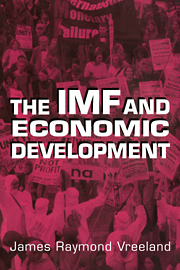Book contents
- Frontmatter
- Contents
- List of Tables and Figures
- Acknowledgements
- 1 Introduction
- 2 Analytically Significant Cases
- 3 An Analytical Approach to the Politics of IMF Agreements
- 4 Testing the Selection Story
- 5 The Effect of IMF Programs on Economic Growth
- 6 Distributional Consequences of IMF Programs
- 7 Conclusions
- Appendix 1 Variables Used in This Study
- Appendix 2 Country-Years in Samples
- References
- Index
6 - Distributional Consequences of IMF Programs
Published online by Cambridge University Press: 08 January 2010
- Frontmatter
- Contents
- List of Tables and Figures
- Acknowledgements
- 1 Introduction
- 2 Analytically Significant Cases
- 3 An Analytical Approach to the Politics of IMF Agreements
- 4 Testing the Selection Story
- 5 The Effect of IMF Programs on Economic Growth
- 6 Distributional Consequences of IMF Programs
- 7 Conclusions
- Appendix 1 Variables Used in This Study
- Appendix 2 Country-Years in Samples
- References
- Index
Summary
The question of why governments participate in IMF programs was originally raised as a means to an end. To evaluate IMF program effects, one must understand selection into IMF programs. The results from Chapter 5 indicate that the effects of IMF programs on economic growth are negative. Ironically, this finding leads directly back to the selection question: If IMF programs hurt growth, why do governments enter into these agreements? The argument laid out in this book is that governments want IMF agreements to help push through policies that face opposition. But why do governments seek to push through policies that hurt growth? The goal of this book was to answer the growth question, but this new question is simply too intriguing to leave hanging.
One possibility, proposed by Pastor (1987a, 1987b), is that governments bring in the IMF for distributional reasons. Pastor found that the labor share of income decreased under IMF programs. Since Pastor's study, a second large-n study (Garuda 2000) has largely confirmed the finding that IMF programs increase income inequality.
Note that if IMF programs increase income inequality, then the less-well-off are definitely worse off when governments participate. Growth of total output is lowered and their share of output shrinks as well. But the same is not true for those at the upper end of the income distribution. Although overall economic growth may suffer under the IMF, some groups may gain because of distributional shifts.
- Type
- Chapter
- Information
- The IMF and Economic Development , pp. 134 - 151Publisher: Cambridge University PressPrint publication year: 2003



